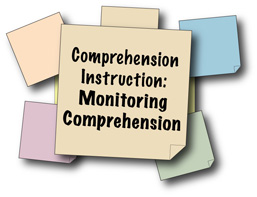What should content-area teachers know about comprehension instruction?
Page 10: Monitoring Comprehension
 Monitoring comprehension is a process in which students determine whether they understand what they are reading. If they realize that they cannot articulate the main idea of the passage, they can take steps to repair their comprehension before continuing to read.
Monitoring comprehension is a process in which students determine whether they understand what they are reading. If they realize that they cannot articulate the main idea of the passage, they can take steps to repair their comprehension before continuing to read.
Most successful student readers intuitively monitor their comprehension. However, some who struggle with reading either might not recognize a breakdown in their comprehension or else might not know how to fix it when it does occur. When asked whether they read the material, these students might answer yes. Indeed, the students might have decoded every word, but they did not comprehend what they were reading. Even students who are typically competent readers may not self-monitor comprehension in subject areas they find challenging.
 It is not effective to merely tell students to monitor their reading comprehension. Rather, students need to be taught how to monitor their comprehension. This requires explicit instruction with sufficient modeling and guided practice. Content-area teachers can demonstrate how to:
It is not effective to merely tell students to monitor their reading comprehension. Rather, students need to be taught how to monitor their comprehension. This requires explicit instruction with sufficient modeling and guided practice. Content-area teachers can demonstrate how to:
- Stop at the end of a paragraph, section, or page
- Think about whether the information presented has been understood (e.g., generate a main idea)
- Utilize various fix-up strategies, if necessary
| Examples of Fix-up Strategies |
|
Listen as Deborah Reed shares a story that highlights the importance of monitoring comprehension (time: 2:28).

Deborah K. Reed, PhD
College of Education, University of Iowa
Director, Iowa Reading Research Center
Transcript: Deborah K. Reed, PhD
When I get to the end of a paragraph that I realize somewhere along the line I either stopped paying attention or got lost in the words or in some way I didn’t understand, I have a number of things that I will do to fix that up. It may frustrate me, but I know I need to do it or there’s really no point in going forward. Students who have struggled with reading, I think they don’t really ever expect to understand. Students who don’t expect to understand anything anyway get to the end of the paragraph, and they just keep going. They don’t know that they should stop, they don’t know that there are other things that they should do to fix it up, and they don’t really believe that they have much control over gaining comprehension from the text. It’s critically important that we show them how we monitor our own comprehension and that even as competent readers occasionally we have to do these things, too. They won’t do it otherwise, if we don’t help them see how important it is. And I think that for even students who are more advanced. If they don’t experience that when they’ve got more teacher assistance in middle and high school then when they get to college where there’s very little teacher assistance, they won’t know what to do in those situations as the text become increasingly more difficult. So reading can’t just be saying every word on the page.
I administered a test not too long ago to a middle-school student. He read the passage out loud to me, and when he got to the end, I asked him to tell me about what he just read. Then he looked at me with this disgusted look and said, “No. I just read it.” That drove home to me this idea that somehow he’s picked up the idea that reading is just saying the words out loud, that he wasn’t ever expected to gain meaning from what he was reading and had no way of knowing how to stop and check on that himself. Think of him going through all of his classes all day long, being told read this chapter, read this passage. That’s what he’s doing, but he’s not gaining any meaning and doesn’t understand how to use that for informational purposes to support his learning of this content.
For more information on monitoring reading comprehension, view the following IRIS Modules: